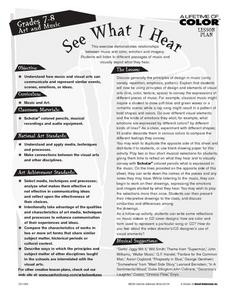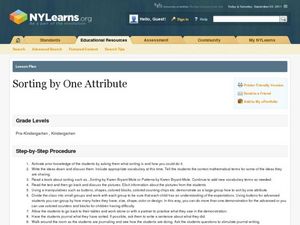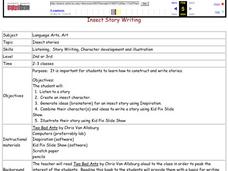Curated OER
Match the Letters
Build a foundation of alphabet familiarity using this matching activity. Learners focus on lowercase letters a, o, c, d, g, and q as they match balloons to corresponding children. Each balloon and child has a letter inside, so...
Curated OER
Natural Beauty: Looking Sharp
Students create covers for their "nature journals" using watercolor techniques and the artistic ideas of color, depth, and focal point. This instructional activity can be used in the Science or Art classroom and meets national standards...
Curated OER
Shapes and Colors: Ovals
In this shape worksheet, students color a set of 6 ovals, then color each a different color. Students then trace and color a set of 4 oval balloons.
Curated OER
Shapes and Colors: Triangles and Rectangles
In this shape and color worksheet, students trace all triangles in a set of 4 different shapes and color each one green, then trace all rectangles, coloring them brown. Students trace and color 5 triangle "trees."
Print and Practice
Classifying Shapes
In this classifying shapes worksheet, students color the shape in a row that is different from the rest. Answer key is provided.
Curated OER
Sesame Street Letter Recognition
Students study the letters of the alphabet, explore different shapes, rhyme, and listen to the different sounds of the alphabet to help them sound out words and begin elementary level reading.
Curated OER
Different Minerals
In this minerals worksheet, students read about the relationship between elements, rocks and minerals. They experiment using 6 different colored gumdrops to represent 6 common elements. Students construct gumdrop and toothpick models of...
Curated OER
Getting in Shape Again
Students create rocket shapes out of pattern blocks. They draw a picture of a rocket, build a pattern block rocket following simple directions, and complete a graph of the shapes used.
Curated OER
Adventure Into The World of Shapes
Students view Elmer Holtzrichter's work Mystery Planet and discuss basic shapes and patterns. They create their own collage. and discuss the patterning they created. Students demonstrate how this pattern would sound with clapping and...
Curated OER
See What I Hear
Students investigate the link between music and visual art by applying principles of design to convey the emotions/expressions in different types of music.
Curated OER
A Little Kandinsky For All
Students create abstract compositions based on the later works of Wassily Kandinsky using the primary colors in this early elementary Art lesson. The lesson emphasizes the use of color, lines, and shapes to create the abstract works of...
Curated OER
Sorting By One Atrribute
Students use different color items to sort by color and different attributes of the manipulatives given to them. In this sorting lesson plan, students also write a journal entry or draw a picture of their activity.
Curated OER
Math: Odd Object Out
Students discover how to classify and categorize items by sorting various objects. As they sort the items, they explain how the items are alike. By repeating the sorting procedure several times, students determine there are numerous...
Curated OER
Cool Flip Books
Students assemble a flip book to visualize cause and effect, problem solving and sequencing. They use the books to show movement, color and different types of elements of art.
American Museum of Natural History
All About Horses
Horses come in all shapes and sizes, but all belong to the same species. Young scholars explore the different traits and connect the information to genetic modification. The interactive gives them the option to read about 18 different...
SeaWorld
Design a Fish
Craft some neat refrigerator magnets while studying ocean animals with a lesson about the anatomy of a fish. After kids learn about the different parts and shapes of fish, they use modeling compound to design their own fish.
Howard Hughes Medical Institute
Stickleback Evolution Virtual Lab
How quickly do animals evolve? Can comparing different samples of the same fossil answer timeline questions? Scholars use virtual labs to examine fossils and learn about stickleback evolution. They compare pelvic morphology in lakes...
K-5 Math Teaching Resources
5x5 Geoboard Paper
Geoboards can take up a lot of space in the classroom; instead use this 5x5 geoboard paper! Six geoboards and lines for writing are included in this multi-use printable and template.
Discovery Education
Cool It!
Adjust the melting time of ice without varying the temperature! Learners experiment with different materials to decide how the materials affect the rate an ice cube melts. They then connect their findings to the conductivity of each...
Curriculum Corner
Coniferous and Deciduous Trees
What are the differences between coniferous and deciduous trees? Supplement your tree lessons with a set of activities that has learners describing, naming, comparing, and reading about deciduous and coniferous trees. The activities are...
Curated OER
The Sponges
In this sponge worksheet, students read about the different parts of a sponge and answer 20 short answer questions that follow. They color and label different sponge drawing.
Curated OER
Match the Letters
Pre-readers need to build a foundation of familiarity with letters. This visual matching worksheet has youngsters pair bees with flowers based on the lowercase letter inside each. They work with the letters t, j, d, i, p, and...
Curated OER
Goldsworthy Project: Building With the Five Elements of Art
Seventh graders explore the five elements of art: line, shape, value, texture and color. They collect items from nature and arrange them aesthetically taking the five elements into consideration. They consider their work from several...
Curated OER
Who Lives with Mallard?
Students color a picture of the habitat featuring mallard and other creatures, some of whom might be camouflaged or half-hidden. They discuss other forms of animal adaptation.























